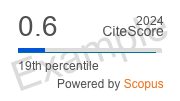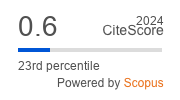The role of consultative conversations with psychoemotional correction in patients after endovascular occlusion of open foramen ovale
https://doi.org/10.29001/2073-8552-2024-39-2-195-198
Abstract
The article discusses aspects of the restoration of the psychoemotional sphere in patients suffering a stroke associated with an open foramen ovale, who underwent endovascular occlusion at the stationary stage. It was revealed that due to their negative social perceptions of the recovery of patients after a stroke, they are afraid to return to an active lifestyle after treatment. The possibility of introducing consultative conversations with psychoemotional correction to create a positive social way of life for patients after a stroke, which will contribute to the restoration of their psychoemotional sphere, is considered.
About the Authors
E. S. TuchikRussian Federation
Evgeny S. Tuchik, Dr. Sci. (Med.), Professor, Department of Forensic
Medicine
1, Ostrovityanova str., Moscow, 117997
A. S. Tereshchenko
Russian Federation
Andrey S. Tereshchenko, Cand. Sci. (Med.), Senior Research Scientist,
Department of X-ray Endovascular Methods of Diagnosis and Treatment
15a, Akademika Chazova str., Moscow, 121552
T. A. Ivanenko
Russian Federation
Tatiana A. Ivanenko, Cand. Sci. (Med.), Associate Professor, Doctor of Physical Therapy and Sports Medicine, Private Practice Doctor
E. V. Merkulov
Russian Federation
Evgeny V. Merkulov, Dr. Sci. (Med.), Chief Research Scientist, Department of X-ray Endovascular Methods of Diagnosis and Treatment
15a, Akademika Chazova str., Moscow, 121552
References
1. Sirsat M.S., Fermé E., Câmara J. Machine learning for brain stroke: a review. J. Stroke Cerebrovasc. Dis. 2020;29(10):105162. DOI: 10.1016/j.jstrokecerebrovasdis.2020.105162.
2. Shi K., Tian D.C., Li Z.G., Ducruet A.F., Lawton M.T., Shi F.D. Global brain inflammation in stroke. Lancet Neurol. 2019;18(11):1058–1066.
3. Pristipino C., Sievert H., D’Ascenzo F., Mas J.L., Meier B., Scacciatella P., et al. European position paper on the management of patients with patent foramen ovale. General approach and left circulation thromboembolism. EuroIntervention. 2019;14(13):1389–1402. DOI: 10.4244/EIJ-D-18-00622.
4. Kulesh A.A., Ognerubov D.V., Mekhryakov S.A., Merkulov E.V., Syromyatnikova L.I., Tereshchenko A.S. et al. Patent foramen ovale-related stroke: diagnostic approaches and the possibility of endovascular prophylaxis (clinical cases and literature review). Neurology, Neuropsychiatry, Psychosomatics. 2020;12(2):72–78. (In Russ.). DOI: 10.14412/2074-2711-2020-2-72-78.
5. Hviid C.V.B., Simonsen C.Z., Hvas A.M. Recurrence risk in patients with cryptogenic stroke, patent foramen ovale, and thrombophilia: A systematic review and meta-analysis. Thromb. Haemost. 2019;119(11):1839– 1848. DOI: 10.1055/s-0039-1693739.
6. Thostov A.S., Nelyubina A.S. Everyday ideas about the disease in the structure of patient and doctor identification as a predictor of the patient’s choice of treatment method (based on the model of cardiovascular diseases). In: Lekhtsier V. (ed.). Remission Society: on the way to narrative medicine. 2012:12–33. (In Russ.).
7. Shklyaruk V.Y., Vasekin Y.I., Konovalova M.P. Promoting awareness of health and life expectancy. Bulletin of the Saratov State Social and Economic University = Industry: economics, management, technology. 2018;(2(71)):200–204. (In Russ.).
8. Mannarini T., Veltri G.A., Salvatore S. Media and social representations of otherness. Springer International Publishing; 2020. DOI: 10.1007/978-3-030-36099-3.
9. Martikainen J., Hakoköngäs E. Drawing as a method of researching social representations. Qualitative Research. 2023;23(4):981–999. DOI: 10.1177/14687941211065165.
10. Negura L., Plante N., Lévesque M. The role of social representations in the construction of power relations. Journal for the theory of social behavior. 2020;50(1):25–41. DOI: 10.1111/jtsb.12213.
11. Normetova Y. The study of socio-psychological approaches to health and disease problems. From the origins to the present: 130 years of organization of the psychological society at Moscow University: Collection of materials of the anniversary conference: In 5 volumes. Moscow, 2015;5:304–306. (In Russ.).
12. Cheremushnikova I.K., Petrov A.V., Chernysheva I.V. Professionally significant attitudes in doctor-patient communication. Bioethics. 2017;2:46– 49. (In Russ.).
13. Madzhaeva S.I., Satretdinova A.CH. Medical information and ecological space of a patient. Ecology of language and communicative practice. 2015;(2):280–286. (In Russ.).
14. Powers W.J. Acute ischemic stroke. N. Engl. J. Med. 2020;383(3):252– 260. DOI: 10.1056/NEJMcp1917030
Review
For citations:
Tuchik E.S., Tereshchenko A.S., Ivanenko T.A., Merkulov E.V. The role of consultative conversations with psychoemotional correction in patients after endovascular occlusion of open foramen ovale. Siberian Journal of Clinical and Experimental Medicine. 2024;39(2):195-198. (In Russ.) https://doi.org/10.29001/2073-8552-2024-39-2-195-198
JATS XML





.png)





























